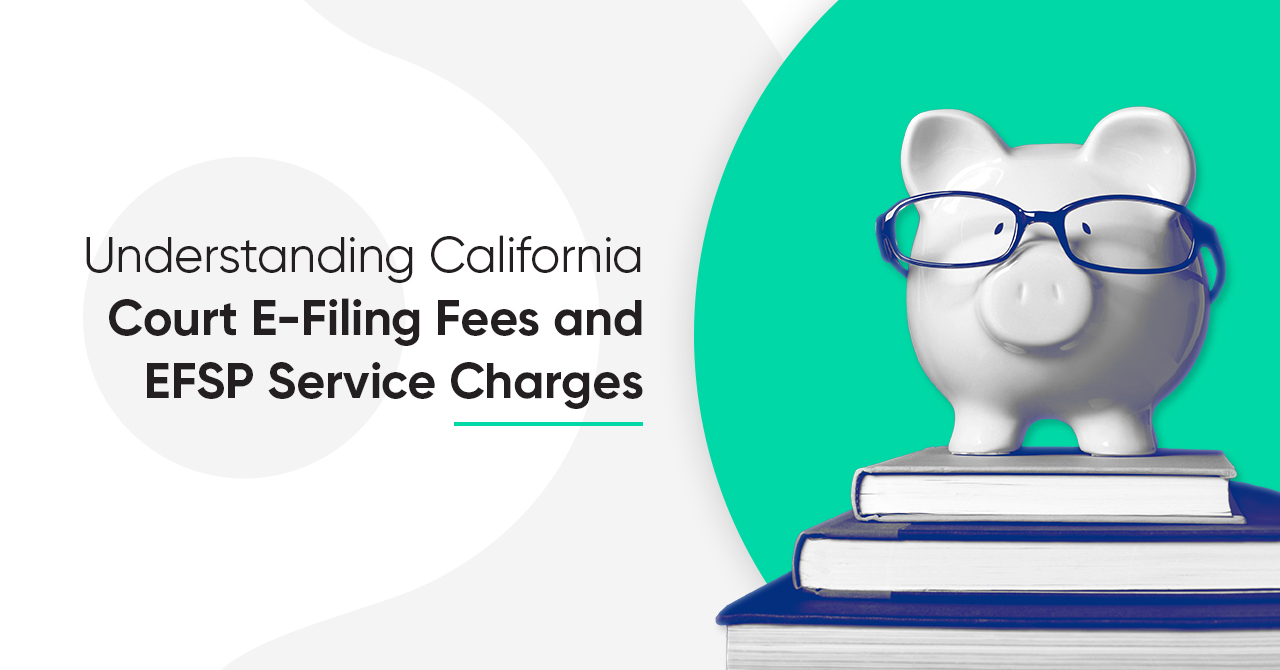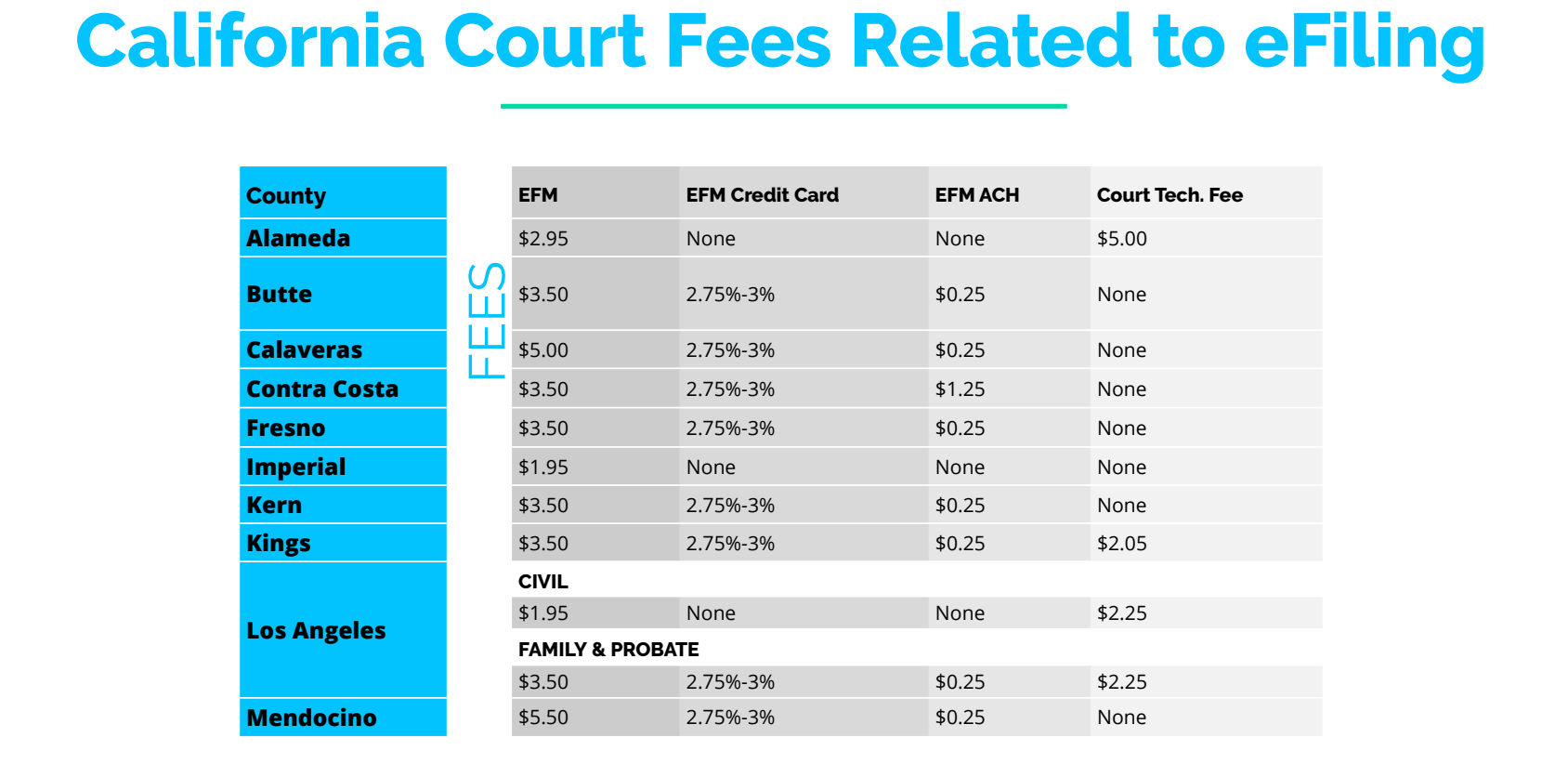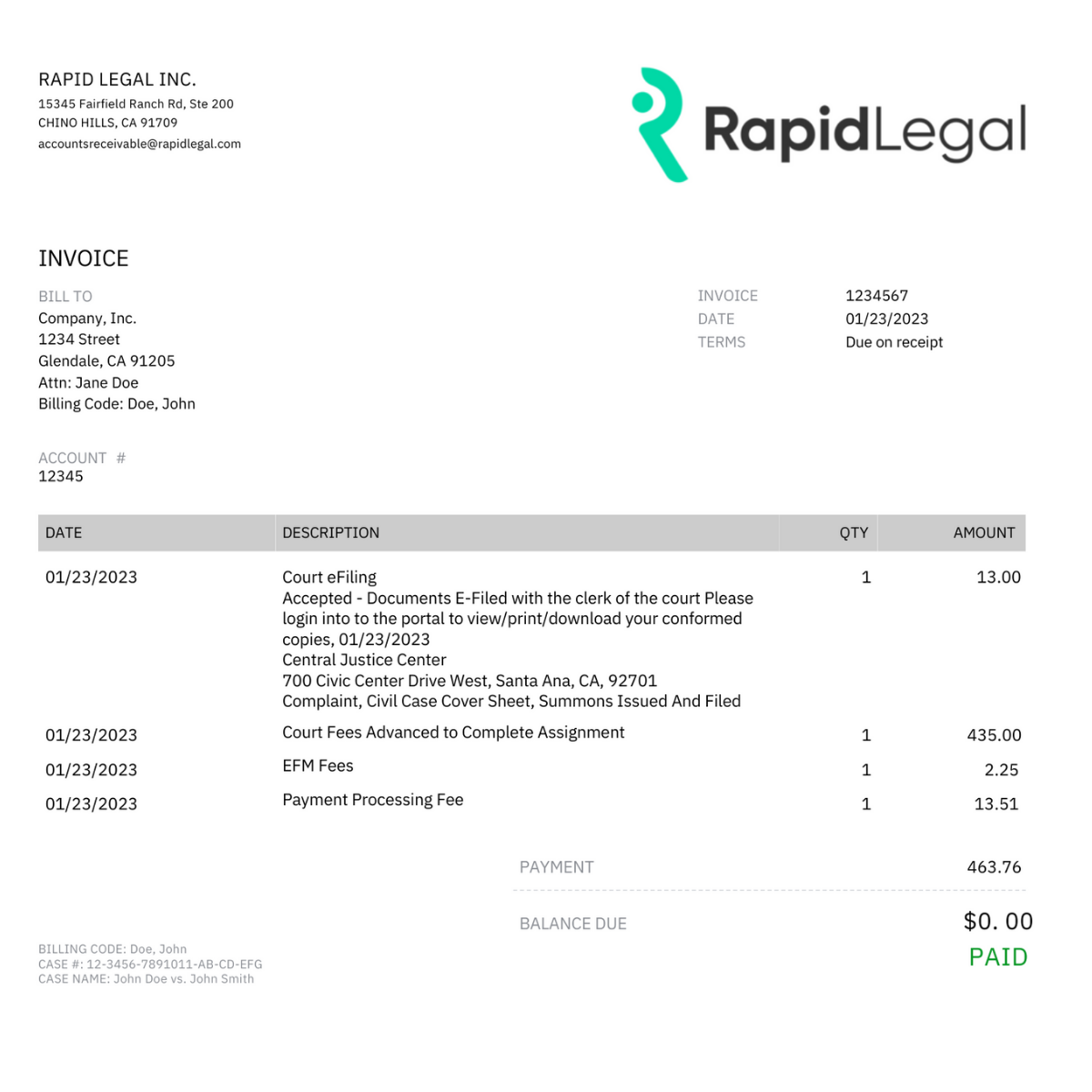
Electronic filing has revolutionized the administration of justice by streamlining court processes and facilitating convenience for both the courts and filers. In our article, “Exploring Stakeholders in the California Court eFiling Workflow”, we examined the main stakeholders of the California Court eFiling system. However, understanding the associated eFiling transaction fees, including court fees and EFSP (Electronic Filing Service Provider) service charges, is essential for filers and legal professionals to recognize. Read on to learn what each fee is, why it exists, and what more you need to know.
An Explanation of eFiling-related Fees and Charges

There are four main types of eFilling-related fees:
- EFM Fees: As a refresher, an Electronic Filing Manager (EFM) is a firewall software layer between outside parties and the court system. Courts do not typically have their own technology development capabilities, so they rely on third-party EFM software providers to integrate with the court’s case management system. This is how California courts enable electronic filing. Two primary EFMs in California are Tyler Technologies (Tyler) and Journal Technologies Inc (JTI). They charge filers an ‘EFM fee’ for allowing users’ documents to be eFiled with the court. This fee is to offset the costs that EFMs incur to develop and maintain their EFM software, as well as to absorb any costs from the court.
- Court Technology Fees: There’s also a fee known as the court technology fee. Some courts charge this fee to help recover their eFiling-related technology investment.
- EFM Credit Card Fees and/or EFM ACH Fees: The court or its software vendors determine whether filers can use ACH and credit cards payment methods when submitting eFiling orders. To enable credit card payments, credit card companies charge merchant fees or payment processing fees which can be incurred by the court or software vendors. To offset those types of expenses, the court or vendor can apply a court convenience fee to filers.
- Service Charges: These are the only fees paid to Rapid Legal, or the EFSP of choice, for its services.
Court fees are paid in advance by Rapid Legal, or the EFSP, to the courts on behalf of law firms and filers. EFM fees are also paid in advance by Rapid Legal to the court or the court’s case management vendor for each eFiling.
Sample Invoice for an eFiling Transaction
This sample invoice itemizes the fees due for each eFiling transaction by Rapid Legal.

- Court eFiling (Service Fee): This is the only fee paid to Rapid Legal for its eFiling service.
- Court Fees Advanced to Complete Assignment: These are civil fees that are required by the court. Fees vary based on cases and documents filed.
- EFM Fee: This is the EFM’s fee for facilitating the transmission of a filing between the EFSP and the court, on behalf of the filer.
- Payment Processing Fee: This fee is charged to recover the costs merchants, like Rapid Legal, pay to enable customers to use a bank account or credit card for eFiling and other court services.
Please note: The sample invoice is subject to change and is used for explanatory purposes in this article only.
eFiling Knowledge is Power
Comprehending the nuances of eFiling-related fees and charges empowers legal professionals and filers to navigate eFiling-related costs. These fees primarily consist of Electronic Filing Manager (EFM) fees, Court Technology fees, EFM Credit Card or ACH fees, and Service Charges. The EFM fees are crucial for facilitating eFiling by acting as a bridge between filers and the court system. Court Technology fees assist in recovering the technological investments made by the courts in enabling eFiling. EFM Credit Card or ACH fees offset the costs associated with payment processing methods, ensuring convenient transactions for filers. Additionally, Service Charges encompass the fees paid to the Electronic Filing Service Provider (EFSP) for their valuable services.
Rapid Legal eFiles into all eFiling-enabled California counties.
Learn how to do it right with our Complete Beginner’s Guide to eFiling.
Furthermore, we provided a breakdown of a sample invoice for an eFiling transaction, illustrating the various fees involved, including the Court eFiling service fee, court fees advanced to complete assignments, EFM fees, and payment processing fees. This detailed invoice serves as a helpful reference to elucidate the fees associated with eFiling transactions.
Advocating Transparent Fee Structures and Pricing for Success
By now, you have gained a comprehensive understanding of eFiling-associated fees and their purpose. At Rapid Legal, we prioritize simple, clear fee structures and pricing for law firms.
Reach out to us today to schedule a demo or arrange a call with a Rapid Legal account manager. Discover how we can become your strategic ally, aiding your law firm in effectively handling eFiling fees and efficiently managing costs related to litigation support services.
Get Started Today
Spend more time on billable client hours and less time tracking down conformed copies and proofs of service.